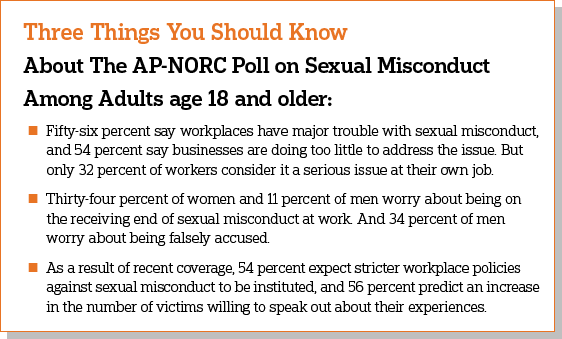
Sexual misconduct is viewed by both men and women as a pervasive problem in American society—one that occurs all too regularly and with serious repercussions. In the latest survey from The Associated Press-NORC Center for Public Affairs Research, most Americans are hopeful that the current attention being given to this problem will lead to some positive change.
Workplaces are seen as having major trouble with sexual misconduct and as doing too little to address the problem. However, few employed people agree that their own place of work needs to deal with the same issues.
Fifty-six percent of Americans predict that the number of victims willing to speak out about their experiences will increase in the wake of the recent revelations, and 54 percent anticipate the implementation of stricter workplace policies. Forty-three percent say observers of this behavior will be more likely to come forward now.
But the public is more skeptical about specific benefits for working women. Only 8 percent anticipate a lot of change for the better for women in the workplace, and 47 percent anticipate some positive modification. Forty-four percent do not expect any constructive change to come out of the new recognition of sexual misconduct.
One-third of employed women worry about being on the receiving end of sexual misconduct at work. The same number of men have concerns about being falsely accused. However, fabricated allegations of sexual misconduct are not seen as particularly widespread by most Americans, and few think employers have been too tough on their staff who have been accused.
The survey showed that anger is the most common reaction following encounters with sexual misconduct in the workplace—whether personal experience or observation. Most who have been subjected to this behavior also agree that they feel humiliated and intimidated, and nearly half suffer shame.
The nationwide poll was conducted by The Associated Press-NORC Center for Public Affairs Research December 7-11, 2017, using AmeriSpeak®, the probability-based panel of NORC at the University of Chicago. Other topics covered on the survey are the Russia investigations, presidential approval, and attitudes toward abortion. Online and telephone interviews using landlines and cell phones were conducted with 1,020 adults. The margin of sampling error is +/- 4.3 percentage points.

Other key findings from the poll include:
- Fifty-six percent say workplaces in general have major trouble with sexual misconduct, and 54 percent say businesses are doing too little to address the issue.
- However, only a third of employed Americans see it as a serious issue at their own job. And 67 percent think their own workplaces have been doing enough to deal with sexual misconduct. Forty-nine percent of employed adults have been required to take training at their current job to deal with sexual misconduct.
- Thirty-four percent of women and 11 percent of men worry about being on the receiving end of sexual misconduct at work. On the other hand, 34 percent of men worry about being falsely accused. And 26 percent of men admit to the possibility that they have been a perpetrator of such behavior, even inadvertently.
- Fourteen percent of Americans believe all or most allegations of sexual misconduct to be false, 69 percent say people are falsely accused some of the time, and 16 percent say false allegations are rare occurrences.
- Few Americans think employers are being too hard on staff members who have been accused of sexual misconduct. About 4 in 10 say they are too lenient, and about the same number say employers are handling the problem about right.
- More than 8 in 10 of those who have experienced or witnessed sexual misconduct on the job say they are angry about the experience. Most who have been subjected to this behavior also agree that they feel intimidated (70 percent) and humiliated (65 percent). Forty-eight percent say they are ashamed about the sexual misconduct they experienced at work.
- Sexual misconduct is also seen by most as a serious issue in the government, education, the military, the media, and particularly Hollywood and the entertainment industry. Overall, 62 percent of the public regard sexual misconduct as important to them personally.




